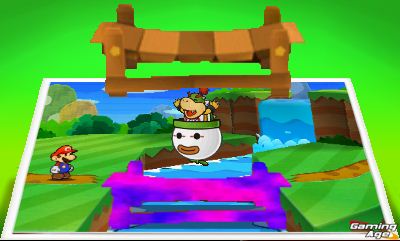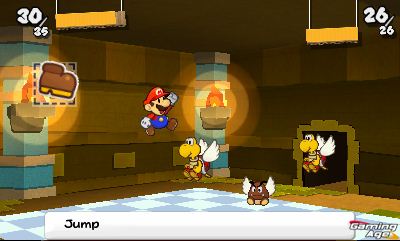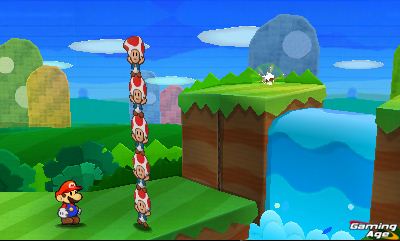Publisher: Nintendo
Developer: Intelligent Systems
Medium: Cartridge/Digital
Players: 1
Online: No
ESRB: E10
The Paper Mario series has seen a strange journey since its beginnings on the Nintendo 64. Over the years, developer Intelligent Systems has altered the formula of what fans can expect from each sequel, leading into a very different take with this release, Paper Mario: Sticker Star for the 3DS. But different certainly doesn?t equal bad, as Sticker Star ends up being a very surprising, and fun change in the formula, and in my opinion puts this a clear step above 2007?s Super Paper Mario on the Wii.
Core concepts are still the same, despite a series of other differences between Sticker Star and its predecessor. You?ll take direct control of a 2D, paperized version of Mario, and explore a number of worlds set in the confines of the Mushroom Kingdom. Everything in the game, from the NPC?S to the enemies you?ll find, are composed of single pieces of paper. The worlds are mostly composed of cardboard in Sticker Star, and overall the paper theme is really well realized. Intelligent Systems has played around with the look of Mario?s paper world in previous games, but Sticker Star feels like they?ve really nailed down the look with plenty of added effects that drive home the paper theme.
 Combat in Sticker Star does take a bit of a turn from past games. There?s still a heavy emphasis on timed attacks, rewarding players for button presses timed correctly with the on-screen animations, dealing heavier damage than a standard attack would. However, you no longer have a standard attack menu, or a partner in tow to deal out more specific attacks. Instead, every attack in game is performed by the stickers you?ll collect throughout the environment of the six worlds presented in Sticker Star, or the stickers rewarded from combat and question mark blocks scattered around. Sticker management seems to be a little tricky at the on-set of the game, and if you?re not particularly diligent in gathering stickers at the start it?s entirely possible to come up short in combat, which will force you to run away. No stickers mean no attacks, but this becomes less of an issue once you complete the first world.
Combat in Sticker Star does take a bit of a turn from past games. There?s still a heavy emphasis on timed attacks, rewarding players for button presses timed correctly with the on-screen animations, dealing heavier damage than a standard attack would. However, you no longer have a standard attack menu, or a partner in tow to deal out more specific attacks. Instead, every attack in game is performed by the stickers you?ll collect throughout the environment of the six worlds presented in Sticker Star, or the stickers rewarded from combat and question mark blocks scattered around. Sticker management seems to be a little tricky at the on-set of the game, and if you?re not particularly diligent in gathering stickers at the start it?s entirely possible to come up short in combat, which will force you to run away. No stickers mean no attacks, but this becomes less of an issue once you complete the first world.
Access to more and more sticker vendors open up over time, allowing you to purchase more powerful stickers, and variants. Along with your standard stickers, you?ll stumble across items labeled simply as ?things?, which provide you with more powerful, special stickers. Things can run the gamut from staplers, to scotch tape, to an air conditioning unit. There are a hefty number of options here, and these things end up being the key to a number of Paper Mario: Sticker Star?s sometimes difficult puzzles, and most of the major boss fights you?ll encounter.
 Paper Mario: Sticker Star divides your typical Mushroom Kingdom setting into six worlds, with three being accessible from the start, giving you some freedom on how you tackle the game. These worlds are presented via an overworld map that harkens back to Super Mario World, and divides those worlds up into stages, like 1-1, 1-2, 1-3, and so on. Certain stages will require a bit of backtracking in order to unveil all their secrets, or to possibly unlock additional exits that will lead to new stages. In fact, most of the stages seem to be packed with secret content, sometimes hidden behind sections that require a specific sticker to open, with others involving more difficult solutions.
Paper Mario: Sticker Star divides your typical Mushroom Kingdom setting into six worlds, with three being accessible from the start, giving you some freedom on how you tackle the game. These worlds are presented via an overworld map that harkens back to Super Mario World, and divides those worlds up into stages, like 1-1, 1-2, 1-3, and so on. Certain stages will require a bit of backtracking in order to unveil all their secrets, or to possibly unlock additional exits that will lead to new stages. In fact, most of the stages seem to be packed with secret content, sometimes hidden behind sections that require a specific sticker to open, with others involving more difficult solutions.
I do feel like some of the puzzles can be needlessly difficult. For the most part, puzzle design in Sticker Star revolves around having the right sticker for the job, which requires a bit of logic on the player?s end to determine the sticker needed to advance. For the most part these solutions make sense, but considering the game features a large number of sticker types and variations, you?ll find yourself stumped on occasion simply for overthinking the solution. This leads to scenarios where you?ll end up wasting a valuable sticker or two, since a sticker used, whether it?s right or wrong, is a sticker lost. These situations don?t occur that often, but when they do it can turn an otherwise enjoyable experience into something much more irritating.
 Of course, the flip side of that would require some more modern day handholding and a hint system that?s little more obvious than the ones doled out by Mario?s constant companion Kersti. And to be quite honest, I really appreciate the angle that Intelligent System?s took by crafting a game that rewards players for ingenuity, and doesn?t paint a clear path for players to follow from beginning to end. It?s a refreshing design approach for not only modern games, but for a Mario game to boot. So in the end I found myself willing to put up with these minor bouts of frustration, knowing that another A-HA! moment was right around the corner. Seriously, Paper Mario: Sticker Star can be difficult, but it?s well worth your time if you?re willing to invest it.
Of course, the flip side of that would require some more modern day handholding and a hint system that?s little more obvious than the ones doled out by Mario?s constant companion Kersti. And to be quite honest, I really appreciate the angle that Intelligent System?s took by crafting a game that rewards players for ingenuity, and doesn?t paint a clear path for players to follow from beginning to end. It?s a refreshing design approach for not only modern games, but for a Mario game to boot. So in the end I found myself willing to put up with these minor bouts of frustration, knowing that another A-HA! moment was right around the corner. Seriously, Paper Mario: Sticker Star can be difficult, but it?s well worth your time if you?re willing to invest it.
Overall, Sticker Star is as far removed from Super Paper Mario as that was from The Thousand Year Door. While you might lament the departure the series has taken from its original RPG roots, this hybrid of adventure and action found in Sticker Star stands out as one of the best entries in the series. It also deftly avoids the label of stale that?s been hanging from the skirt of another 2D Mario series, and provides players with some old-school difficulty that harkens back to the days of gaming that I grew up in. Despite some issues with the solutions expected for various puzzles, I found Paper Mario: Sticker Star to be an excellent release for the 3DS, providing a heck of a handheld experience for fans to sink their time into for the holidays.

